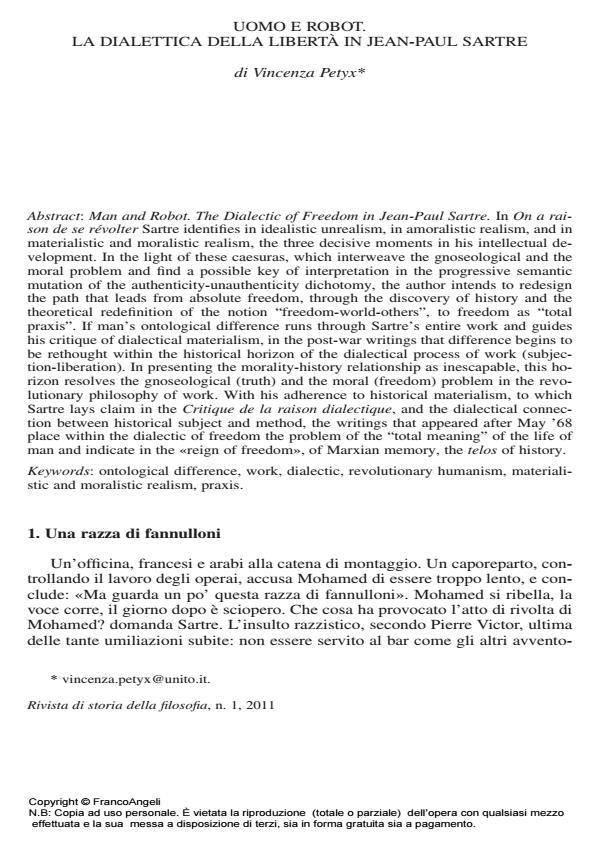Uomo e robot. La dialettica della libertà in Jean-Paul Sartre
Titolo Rivista RIVISTA DI STORIA DELLA FILOSOFIA
Autori/Curatori Vincenza Petyx
Anno di pubblicazione 2011 Fascicolo 2011/1
Lingua Italiano Numero pagine 31 P. 63-93 Dimensione file 905 KB
DOI 10.3280/SF2011-001004
Il DOI è il codice a barre della proprietà intellettuale: per saperne di più
clicca qui
Qui sotto puoi vedere in anteprima la prima pagina di questo articolo.
Se questo articolo ti interessa, lo puoi acquistare (e scaricare in formato pdf) seguendo le facili indicazioni per acquistare il download credit. Acquista Download Credits per scaricare questo Articolo in formato PDF

FrancoAngeli è membro della Publishers International Linking Association, Inc (PILA)associazione indipendente e non profit per facilitare (attraverso i servizi tecnologici implementati da CrossRef.org) l’accesso degli studiosi ai contenuti digitali nelle pubblicazioni professionali e scientifiche
In On a raison de se révolter Sartre identifies in idealistic unrealism, in amoralistic realism, and in materialistic and moralistic realism, the three decisive moments in his intellectual development. In the light of these caesuras, which interweave the gnoseological and the moral problem and find a possible key of interpretation in the progressive semantic mutation of the authenticity-unauthenticity dichotomy, the author intends to redesign the path that leads from absolute freedom, through the discovery of history and the theoretical redefinition of the notion "freedom-world-others", to freedom as "total praxis". If man’s ontological difference runs through Sartre’s entire work and guides his critique of dialectical materialism, in the post-war writings that difference begins to be rethought within the historical horizon of the dialectical process of work (subjection- liberation). In presenting the morality-history relationship as inescapable, this horizon resolves the gnoseological (truth) and the moral (freedom) problem in the revolutionary philosophy of work. With his adherence to historical materialism, to which Sartre lays claim in the Critique de la raison dialectique, and the dialectical connection between historical subject and method, the writings that appeared after May ’68 place within the dialectic of freedom the problem of the "total meaning" of the life of man and indicate in the «reign of freedom», of Marxian memory, the telos of history.
Parole chiave:Ontological difference, work, dialectic, revolutionary humanism, materialistic and moralistic realism, praxis
Vincenza Petyx, Uomo e robot. La dialettica della libertà in Jean-Paul Sartre in "RIVISTA DI STORIA DELLA FILOSOFIA" 1/2011, pp 63-93, DOI: 10.3280/SF2011-001004